June 1, 2007
Air Date: June 1, 2007
FULL SHOW
SEGMENTS
Heating Up the Campaign Trail
/ Jeff YoungView the page for this story
Global warming has emerged as one of the top issues for candidates in the race for the White House. Living on Earth's Jeff Young explores this changing political climate. (06:00)
Fox Goes Green
View the page for this story
Rupert Murdoch’s media empire, News Corporation, the parent company of Fox News, has committed to going carbon neutral by 2010. Host Bruce Gellerman talks with Rachel Webber, the director of News Corp’s Global Energy Initiatives, about the new campaign. (05:30)
The Price of Oil in the Amazon
View the page for this story
For almost three decades, Occidental Petroleum has pumped oil out of the ground from hundreds of wells in the Peruvian Amazon. The company sold the drilling rights in 1999 but eight years later, the indigenous Achuar people from the area are suing Occidental in the United States for harming their health and poisoning their water and land. Living on Earth host Steve Curwood talks with Earthrights International attorney Marco Simons about the suit. (07:45)
The Elusive Okapi
/ Rupert CookView the page for this story
The okapi is a rare animal of the giraffe family that is found only in the rainforests of the Democratic Republic of the Congo. The creature is revered by pygmies who share their threatened habitat of the Ituri forest. Radio Deutsche Welle's Rupert Cook traveled to the Congo in search of the okapi and to find out about conservation efforts. (09:05)
Emerging Science Note/Leap to a Cure
/ Paige DoughtyView the page for this story
There’s a fungus threatening the world’s amphibian populations. But, as Paige Doughty reports, one scientist may have found a homegrown cure for the fungal disease. (01:30)
Union Conservationists
/ Ian GrayView the page for this story
Environmental protection often comes at the cost of jobs for many working class Americans. But many blue-collar laborers also enjoy spending time outdoors. A number of unions from the AFL-CIO hope to balance these interests by teaming up with a coalition of conservation groups to lobby for the protection of game habitat on public and private lands around the country. Living on Earth’s Ian Gray reports. (08:45)
Shine A Light
View the page for this story
After a career in the Marines and Foreign Service, Mark Bent has dedicated himself to bringing light to the billions of people in the developing world without electricity. He spoke with host Bruce Gellerman about his “buy one, give one” solar flashlights. (07:00)
This week's EarthEar selection
listen /
download
An accordionist plays down by the banks of the Charles River in Boston.
Show Credits and Funders
Show Transcript
HOST: Bruce Gellerman
GUEST: Mark Bent, Marco Simons
REPORTER: Rupert Cook, Ian Gray, Jeff Young
SCIENCE NOTE: Paige Doughty
[THEME]
GELLERMAN: From Public Radio International - this is Living on Earth.
[THEME]
GELLERMAN: I’m Bruce Gellerman. With the presidential primaries still months away, climate change heats up as the number one issue.
NAYAK: More candidates have put out comprehensive plans on energy and global warming than on any other domestic issue-- more than health care, more than education. and we just think that’s gonna continue to grow as we get closer to the election.
GELLERMAN: Also, Fox News and green house gas reductions. Media mogul Rupert Murdoch launches a global warming initiative.
WEBBER: Our work really falls into two buckets: it’s a massive effort to reduce our own energies and our carbon emissions and also to engage our audiences around the world on the issue.
GELLERMAN: And, union workers say protecting habitat for hunting can save the environment and a way of life.
MERREL: In Maine anyway, hunting’s always been a way to fill the freezer and cut the costs in groceries.
GELLERMAN: This week on Living on Earth. Stick around!
[NPR NEWS CAST]
ANNOUNCER: Support for Living on Earth comes from the National Science Foundation and Stonyfield Farm.
Heating Up the Campaign Trail
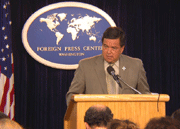
(Courtesy of U.S. House of Representatives)
GELLERMAN: From the Jennifer and Ted Stanley Studios in Somerville, Massachusetts - this is Living on Earth. I’m Bruce Gellerman, sitting in for Steve Curwood.
It puzzles political pollsters. Sixty three percent of Americans say that the country is in as much danger from environmental threats as terrorism. But, typically, come Election Day, voters give environmental issues short shrift. Or, at least, that’s the way it’s been till now. Election 2008 is shaping up differently. With global warming and energy issues on people’s minds, presidential hopefuls are feeling the heat. As Living on Earth’s Jeff Young reports candidates on the campaign trail are making climate change a primary issue.
YOUNG: Al Gore keeps telling us, “no,” he is not running for president.
GORE: I’m really not I’ve fallen out of love with politics (laughing)
YOUNG: But Gore and other climate change activists can already claim a sort of victory in the ‘08 race for the White House. In January Gore told Living on Earth he hoped to see the political climate change when it came to global warming.
GORE: I want to see the creation of a new political reality in America where the candidates in both political parties are competing among themselves to offer genuinely effective solutions.
YOUNG: Just five months later most of the frontrunners in the presidential race are doing just that.
MCCAIN: The facts are facts and climate change is real, and it’s threatening and it’s inevitable that we act
CLINTON: This is a problem whose time has come.
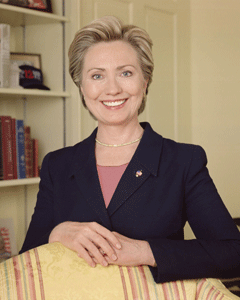
Senator Hillary Clinton, D-NY (Courtesy of U.S. House of Representatives)
YOUNG: And it’s not just soundbites from Senators Barak Obama, Hillary Clinton, and John McCain. All three have detailed plans to cut emissions of the heat trapping gas carbon dioxide. McCain sponsored the first bill in Congress to call for a cap and trade system to control CO2. Clinton and Obama support his bill and call for even stiffer reductions. Former Senator John Edwards proposes ambitious CO2 cuts, and in a symbolic move, Edwards was the first major candidate to make his campaign carbon neutral.
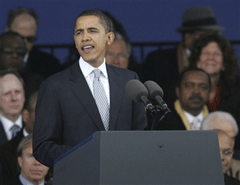
Senator Barak Obama, D-Ill (Courtesy of U.S. House of Representatives)
YOUNG: Navin Nayak with the League of Conservation Voters says most major candidates now have specific and substantial campaign platforms on climate change.
NAYAK: We’re really encouraged that eight months from the first vote more candidates have put out comprehensive plans on energy and global warming than on any other domestic issue, more than health care, more than education and we just think that’s gonna continue to grow as we get closer to this election.
YOUNG: Nayak says candidates are catching up with public opinion, which shifted sharply in favor of action on climate over the past two years. In exit polling from fall’s congressional elections roughly half the respondents said global warming played some role in deciding their vote.
And that lesson is not lost on those Democratic Presidential candidates who are lagging in polls and fundraising. Several have put out bold climate policy as a way to stand out in a crowded field of contenders. Here’s New Mexico Governor Bill Richardson.
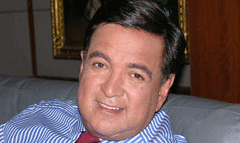
Governor of New Mexico, Bill Richardson (Courtesy of the State of New Mexico.)
YOUNG: Richardson’s aggressive timetable for slashing CO2 and raising auto fuel efficiency won praise from conservation groups.
Connecticut Senator Chris Dodd pushed things a bit further by being the first candidate to propose a tax on high-carbon fossil fuels.
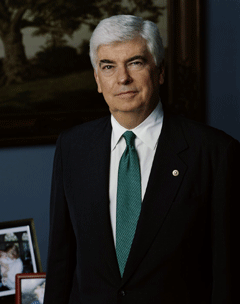
Senator Chris Dodd, D-CT (Courtesy of U.S. House of Representatives)
By swinging for the fence with ambitious programs these so-called second tier candidates are expanding the range of climate solutions in the debate. Among Republicans McCain is so far the only candidate making climate a priority, and he’s doing it in a way he hopes will resonate with Republican primary voters. McCain’s recent speeches cast climate in national security terms.
MCCAIN: A group of senior retired military officers recently warned about the potential upheaval caused by conflicts over water, arable land and other natural resources under strain from a warming planet. It is a serious and urgent economic, environmental and national security challenge.

Senator John McCain, R-AZ (Courtesy of U.S. House of Representatives)
SOUTH: Republican candidates who come into this state and do not take global warming seriously are gonna be in trouble.
YOUNG: That’s Garry South, a veteran political consultant in California. South says California Republicans are environmentally sensitive voters, and Governor Arnold Schwarzenegger’s political comeback proves it. Schwarzenegger recovered from a low point in his first term in part by embracing bold action on climate change. And South says any Republican who hopes to enjoy Schwarzenegger’s success must at the very least acknowledge the threat of global warming.
SOUTH: If you can’t pass that threshold you’re gonna be viewed in California as if you’re from the planet Pluto. And of course you know the planet Pluto was just demoted. The second thing is you have to say something about dealing with the crisis of climate change.
YOUNG: South expects more candidates to tackle climate change as the campaign heats up.
For Living on Earth I’m Jeff Young in Washington.
Related links:
- League of Conservation Voter's "The Heat is On" campaign tracks candidate statements and positions on climate change
- Zogby exit polling on global warming in the 2006 election
Fox Goes Green
GELLERMAN: Well, the current occupant of the White House also seems to have felt the political heat of climate change. President Bush has softened his position as he prepared for the G8 summit meeting. He now says he wants world leaders to meet this fall to come up with targets for reducing greenhouse gas emissions.
BUSH: The United States is taking the lead, and that's the message I'm going to take to the G8. I'm looking forward to working with them.
GELLERMAN: This could represent a change of heart and policy for the Bush administration. In the past its rejected emissions targets in the past.
Well, a change of position on climate change seems to be going around. It was just about a year ago that Fox News channel aired this documentary about global warming:
[FOX NEWS: “Global Warming: the Debate Continues”]
GELLERMAN: The Fox News documentary “Global Warming: the Debate Continues” casts a skeptical eye on scientific findings.
[FOX NEWS: “Global Warming: the Debate Continues”]
GELLERMAN: The Fox News network slogan is: We report, you decide. Well in a surprising move Fox and its parent company News Corporation have now decided global warming is very real and Rupert Murdoch – the global media mogul who owns the company - says he’s going to do something about it. Rachel Webber is director of the effort and joins me on the line:
WEBBER: Hi, thank you for having me.
GELLERMAN: So, what is News Corp. doing now in terms of global energy? Why are you changing?
WEBBER: Well, we’ve recently launched our permanent commitment to energy use and climate change. And our work really falls into two buckets. It’s a massive effort to reduce our own energy use and carbon emissions and also to engage our audiences around the world on the issue. By 2010 we’ve set the target that each one of our businesses will be carbon neutral, so we’ll reach zero carbon emissions. We’ve intentionally set the target a few years away in order to focus on squeezing out as many energy reductions as possible first.
GELLERMAN: Well, for News Corporation and Rupert Murdoch this is a big change of heart.
WEBBER: We really see this as falling in line with what the company does. We’re always looking to innovate. We’re always looking to what do our audiences care most about and there’s no doubt that climate change and energy use is, one of, if not the biggest consumer facing issue of the next decade.
GELLERMAN: I know that when Rupert Murdoch made this presentation to the employees around the globe, he said , “Climate change presents clear catastrophic threats. We may not agree on the extent but we can’t afford the risk of inaction.” And he puts the accent on afford. I mean, it’s a business decision.
WEBBER: Yes, this is clearly a big business opportunity. And I think a number of companies out there have really proven that there’s a space here for businesses to get involved. Whether it’s in developing new technologies or engaging with a consumer through a technology that they’re going to implement in their homes or into their business life. And there’s a chance to save money with our operations. When you’re reducing energy use you’re reducing your costs. Recently we completed the measurement of our carbon footprint which was just under 650,000 tons of carbon, which isn’t enormous when you look at the grand scheme of the issue, but it’s definitely a place where we can make our start.
GELLERMAN: I heard on the set of 24 that you’re using a biodiesel generator.
WEBBER: Yeah, we’re looking, we’ve started using biodiesel generators and we’re looking at ways to cut carbon as much as we can. It’s hard in some places because of what’s available. And it’s an opportunity also to kind of put that demand out there.
GELLERMAN: Is it true that Rupert Murdoch recently bought a hybrid car?
WEBBER: Yes.
GELLERMAN: Really?
WEBBER: Mhmm. It’s a, I think it’s the Lexus Hybrid, that he has.
GELLERMAN: Uh huh. Ms. Webber, wasn’t it you guys who were telling the world that climate change, you know, was hog wash and let’s listen to Sean Hannity. We have a clip of him.
HANNITY: First of all, the first thing I want to say is any time you talk to Al Gore or any of these liberal global warming hysterical people they all say the debate is over. So, I’m going to put up on the screen a list of scientists that indeed do question and are skeptics of this new mad hysteria here.
GELLERMAN: So, liberal global warming hysterical people.
WEBBER: Well, I think there’s always going to be questioning about these issues and I think it’s healthy to, to, to enter into a debate over what the solutions can be. And what we’re doing as a business, this is not a journalistic mandate. And our company prides itself on journalistic independence and that’s at the core of what our company does.
GELLERMAN: Is there no politics behind this question? Is it simply…
WEBBER: No I think what’s really exciting here is that this is de-politicizing the issue if anything. This is, this is saying this is an important issue to our audiences and we have the opportunity to make a change in house and out of house and I think it’s really exciting for our employees as well. It’s really, as it becomes more and more solution based it becomes more exciting about re-envisioning what a cleaner more efficient future could look like.
GELLERMAN: Well, Ms. Webber I want to thank you very much.
WEBBER: Thank you.
GELLERMAN: Rachel Webber is the director of News Corporations Global Energy Initiative.
Following Rupert Murdoch’s announcement, NBC Universal got into the act with its “Get on Board” program. The company vows to cut greenhouse gas emissions by three percent by 2012. It’s part of the parent company General Electric’s “ecomagination” campaign.
MUSIC: Anonymous “Fox News Blast (Theme Sting)” from ‘FOX News, News Corporation’ (May 2007)
Related link:
News Corporation
Coming up: it looks like a zebra at least from behind but it’s really a member of the giraffe family. An intrepid reporter and pygmy guide search for the elusive and revered okapi. Just ahead on Living on Earth.
TRANSLATOR: Desiree has just said that the tracks are today’s tracks.
GELLERMAN: That’s just ahead on Living on Earth.
[MUSIC: Don Ross “Afraid To Dance” from ‘Masters of the Acoustic Guitar’ (Narada - 1997)]
The Price of Oil in the Amazon
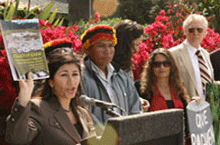
While lawyers and plaintiffs look on, Atossa Soltani, founder of Amazon Watch, reveals violations by Occidental Petroleum based on information gathered by a team of experts in May 2006. (Photo: Antoine Bonsorte)
GELLERMAN: It’s Living on Earth. I’m Bruce Gellerman. Beneath the vast Amazon rainforest are rich fields of crude oil and gas mixed with hot, salty, water and heavy metals. For nearly 40 years, oil companies including PetroBras, Harken Energy, Burlington, Hunt Oil, and Occidental Petroleum have been drilling in the remote rainforests of Brazil, Ecuador and Peru. The Achuar people, who live deep in the Amazon basin of Peru, know the effects of foreign companies’ exploration. Until 1999, Occidental Petroleum drilled in the region and then sold its rights in the Achuar territory to another company.
To get there, you start in the city of Iquitos, the gateway to the Peruvian Amazon and travel until the road ends. From there, it’s up river. Even by fast boat it will take you at least 24 hours to reach the oil-rich Achuar land. Now, eight years after Occidental left the region, the Achuar are suing the company, claiming the drilling has poisoned their people and polluted their homeland and waterways. Marco Simons is legal director for Earthrights International and one of the attorneys representing the Achuar. Living on Earth host Steve Curwood recently spoke with Mr. Simons about the lawsuit.
CURWOOD: Let’s begin with human health. What do the Achuar say happened to them as a result of the oil activity on their land in northern Peru?
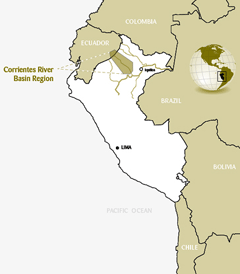
The indigenous Achuar territory lies in the Corrientes River Basin of the Peruvian Amazon. (Courtesy of EarthRights International)
CURWOOD: Now Occidental Petroleum says it has no scientific data of any negative health effects resulting from its operations in Peru.
SIMONS: Yeah, I’m not sure how they can say that because they now have the results both of the studies that we conducted and of the studies conducted by the Peruvian government itself. So, at this point their denials are ringing a bit hollow.
CURWOOD: So what was the pathway for this lead poisoning to get into the communities?
SIMONS: Well, we’re still exploring the precise vectors but it looks like one of the primary methods of contamination was the discharge of what’s known as produced waters. And when you drill for oil what comes out of the ground is not just crude oil. It’s mixed in with a large amount of water, and heavy metals, and salts. And this goes through what are called separation batteries in order to extract the crude oil. And then they discharge the rest of it as produced waters.

While lawyers and plaintiffs look on, Atossa Soltani, founder of Amazon Watch, reveals violations by Occidental Petroleum based on information gathered by a team of experts in May 2006. (Photo: Antoine Bonsorte)
CURWOOD: Now, what are the damages the Achuar claim they suffered beyond their own personal health problems?
SIMONS: Well, the health problem is the major complaint, obviously, but it extends far beyond that. The Achuar have noticed over the years that the fish in their rivers have declined in yield and also declined in quality. I talked to many people in my visit to the region who describe cutting open fish and when they cut open the fish it’s pure petroleum inside. When they cook the fish, they become hard because of the hydrocarbons inside. And so they, to a person, everyone commented on the decline of the fish stocks over the years and this is the main protein staple of these Achuar communities.
CURWOOD: So, Achuar lived along side Occidental Petroleum for decades there in the Peruvian Amazon and the company is quick to point out that it’s sold its oil rights and facilities in the region eight years ago to the Argentine company Pluspetrol. So why did you wait until now to file your lawsuit?
SIMONS: First it took a while for the Achuar to really become cognizant of their rights as a people. There’s been a growing recognition of indigenous people’s rights in Peru and throughout the Amazon over the last decade. And second, it’s only recently that the full scale of the health impacts on the Achuar population has become known. For years the Achuar have been in dialogue with Occidental Petroleum. But Occy has always said, “We don’t have any scientific evidence of any harms to the Achuar people from our operations.”
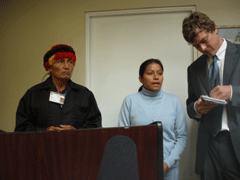
Tomás Maynas Carijano, Achuar community elder; Petronila Chumpi, an interpreter, and Marco Simons, Legal Director for Earthrights International at the announcement of the Achuar suit against Occidental in Venice, California. (Photo: Ingrid Lobet)
CURWOOD: Now, what about this Argentinean company Pluspetrol that has taken over from Occidental Petroleum in the area? As I understand it they have signed an agreement to clean up the area. It’s going to cost them, what, 200 million dollars? In your opinion, what will be left to do after that money is spent?
SIMONS: Well, it’s important to note that the agreement that Pluspetrol signed with the Achuar essentially only applies to Pluspetrol’s operations. So, while Pluspetrol has agreed to clean up its own mess and to stop the practices that contribute to pollution on an ongoing basis Pluspetrol has not agreed to clean up everything that Occy left behind. And so that still remains for Occy to do. Besides which even if Pluspetrol were to remediate the environment there is still the human health aspects of this which have not been accounted for by the agreement with Pluspetrol. The Achuar need medical care. They need monitoring of their medical conditions to ensure that children who are suffering from lead poisoning get the appropriate treatment. And finally, of course, there are past harms which can not be remediated by cleaning up the mess now. And the Achuar are seeking compensation for that and that compensation is largely Occy’s responsibility.
GELLERMAN: Marco Simons, legal director for Earthrights International, spoke with Living on Earth host Steve Curwood. We contacted Occidental Petroleum for a response but they declined our request for an interview. However, a company spokesman quoted in the Los Angeles Times, said the lawsuit contains numerous inflammatory statements and unfounded conclusions and told Reuters its “operations were consistent with Peruvian government requirements and with internationally-recognized standards for oil and gas operations.”
[MUSIC: Q&A: Dave Crossland “Easy Money” from ‘Pearl’ (Road Monkey Music - 2006)]
Related links:
- Occidental Petroelum Corporation
- EarthRights International "A Legacy of Harm"
- Amazon Watch
GELLERMAN: You can hear our program anytime on our website, or get a download for your MP3 player, the address is L-O-E dot org. That’s L-O-E dot O-R-G. You can reach us at comments @ l-o-e- dot org, once again comments at l-o-e dot o-r-g. Our postal address is 20 Holland Street, Somerville Massachusetts, 02144 and you can call our listener line at 800 218 –99-88. CD’s and transcripts are fifteen dollars.
The Elusive Okapi
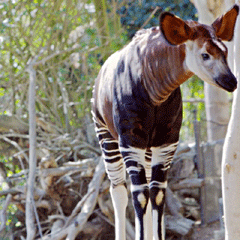
The okapi. (Photo: David Eppstein)
GELLERMAN: From the Amazon rainforest, we now travel to the Ituri rainforest in the Democratic Republic of the Congo in the heart of Africa. It’s here you’ll find one of the rarest animals in the world--the okapi. European colonists called it “the African unicorn” The okapi is an odd-looking animal with striped legs, big ears and a long, black tongue. The okapi shares the Ituri forest with the Mbuti pygmies. The pygmies’ forest habitat has been under threat and so too has the okapi. Rupert Cook of Radio Deutsche Welle set out in search of the okapi and has our report.
[SOUND OF A THUNDERSTORM]
COOK: Rainy season in the forests of Ituri province in Northeastern Congo. At its most torrential the curtain of rain reduces visibility to a few meters. While uncomfortable for humans, the downpour is ideal cover for the okapi, a rare and highly elusive relative of the giraffe thought to be found only in the forests of the Congo. Until recently more than ten years of war and instability made it too dangerous for visitors to experience first hand the okapi’s natural environment and the intensity of the Ituri’s lush Central African climate.
But with recent elections and the gradual stabilization of the country there’s once again the opportunity to explore the okapi’s magnificent forest habitat and learn just what makes it so unique. Jean Joseph Mapulanga is the chief warden for the okapi wildlife reserve, a protected area of 18,000 square kilometers in Ituri forest.
MAPALANGA: The okapi it is very rare species. The okapi is a symbol of the country. You see the money, the Congolese Franc, you see the symbol of the okapi. And the other aspect, the okapi is a symbol of traditional leader. And that’s why people say, “no, we have to protect this symbol.”
RUFF: It’s a very quiet animal and it’s very fascinating. Because as more as you watch them and as more as you think you get to know an okapi you’re never at the end of discovering new behavior.
COOK: Rosemary Ruff runs Gilman International Conservations okapi conservation project at the Epulu breeding and research station in Ituri forest, which for the last 19 years has taken the lead in protecting the okapi.
RUFF: It’s quite an exceptional animal. Many people don’t know the okapi, they never heard the name. They don’t even know how it looks like. So it has some kind of mystery around it.
COOK: From a distance the okapi’s rear resembles that of a zebra with black and white stripes on its hind legs. The almost elastic suppleness of its neck reminds one of a giraffe. While its silent and graceful movement recalls the limber poise of the antelope. Only scientifically recognized in 1902 the okapi has proven remarkably successful at maintaining its reputation for elusiveness. Sightings in the wild tend to be few and far between as I discovered.

The okapi. (Photo: David Eppstein)
[KAPAMBA SPEAKING LOCAL LANGUAGE]
COOK: Desiree has just said that the tracks are today’s tracks. He’s just pointed out one of the plants, the musala plant, which is the name in the Mbuti Pygmy language and also another plant, which is called kiki, and both of these plants are eaten by the okapi. The plant has been almost totally stripped bare of leaves and on the few that remain there are clear bite marks. And what Desiree thinks is that perhaps the okapi was here this morning, may even have heard us and then made its escape.
[WALKING AND HEAVY BREATHING SOUNDS]
COOK: We’ve been walking now for around two hours and Mtaka, the tracker, and Phillipo, one of the pygmies have just discovered two quite large piles of okapi droppings. These are fresh, from this morning. That at least proves that the okapi was within very close proximity to us. When it heard our approach they took off into the forest.
At the Epulu Station in the reserve 15 okapis are kept in captivity in their natural environment, free to roam around their spacious enclosures in the forest. The okapi at the station receive much of their food thanks to the Mbuti Pygmies. Everyday in the early morning, half light, they go out into the forest and forage for some of the 33 different varieties of leaf which the otherwise free ranging okapi normally eats in the wild.
[MBUTI PYGMIE SPEAKING LOCAL LANGUAGE]
COOK: Mbuti Pygmies from Ituri forest describe the okapi’s very special significance for Mbuti culture. This collective and cultural attachment to the okapi borders on almost spiritual reverence. Kowla Nuango is director of the international NGO the Wildlife Conservation Society or WCS at the Okapi Wildlife Reserve.
NUANGO: Pygmies are the first habitants of this area and for them seeing the beautiful okapi, they call it in their local language yarabi. That means my recall of God. That means traditionally pygmies do not hunt okapi and do not eat okapi too, even the meat because they believe they are God. It’s God with them.
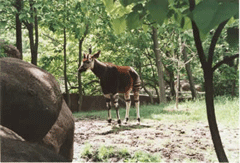
The Okapi is a member of the giraffe family. It's seen here at the St. Louis Zoo. (Courtesy of the State of Missouri/ Belinda Lewis)
COOK: Well, we’re now coming up to the enclosure of tattoo. And tattoo was born on the fourth of September 1995. And she’s just coming towards us right now.
RUFF: She’s very curious. Maybe we can go a little bit further inside. It takes a while before she makes her decision to approach us.
COOK: Well, we’re waiting maybe 15 meters away from her. She seems to be looking very intently right now. Her ears are drawn back. They are so large one really can imagine how acute their hearing is.
RUFF: Tattoo. Come on girl. Now she is slowly moving up to us. Good girl. Good girl.
COOK: Well, I’m just about to touch her right now.
RUFF: Yeah, it’s not a problem.
COOK: Just touching her there’s this definite grease on her hide. It’s very very fine hair as well. Dark brown. It’s like velvet: lustrous, shiny. One of the things that really strikes me, perhaps I’m anthropomorphizing, but there is a personality to each of these individual okapi isn’t there?
RUFF: Absolutely yes. All of our 15 okapis none of them has the same character.
COOK: Despite the years of strife and lawlessness the okapi survives in its isolated splendor in the forests of Ituri. Both the Mbuti Pygmies as well as local and international conservationists deserve much credit for their determined protection of the okapi. Yet severe threats remain. Rosemary Ruff.
RUFF: I think for conservation people it looks like a huge mountain ahead of us in order to save it, if you want to secure the okapi habitat you need to secure the tropical rainforest in Ituri. It’s going to be quite the challenge I think. From our side we can help a lot in refusing to purchase tropical wood, timber. And I think it needs to be aware in our culture that if we buy some tropical timber we do actually help to destroy the okapi habitat. I hope people realize that.
[SINGING IN LOCAL LANGUAGE: Mbuti pygmy women singing in Ituri Forest Village, Democratic Republic of Congo, Africa (Recorded live by Rupert Cooke for Deutsche Welle Radio)]
COOK: Rupert Cook, Ituri forest, Northeastern Congo.
GELLERMAN: Our story on the okapi comes to us courtesy of Radio Deutsche Welle.
Related links:
- UNESCO: Okapi Wildlife Reserve
- Wildlife Conservation Network: Okapi Conservation Project
- University of Michigan Museum of Zoology: Okapi
GELLERMAN: Just ahead: changing the world, one solar flashlight at a time. But first this Note on Emerging Science from Paige Doughty.
Emerging Science Note/Leap to a Cure
[FROG AND FOREST SOUNDS]
DOUGHTY: Deep in the heart of the forested mountains of Virginia a red-backed salamander lives beneath a decaying log. The lungless creature breathes through its skin and eats a range of insects. It seems a simple existence, but all that may change soon.
[SCIENCE NOTE THEME]
DOUGHTY: For more than 15 years amphibian experts have been combating a deadly fungal disease, Chytridiomycosis, which has been threatening the world’s amphibian populations. But scientist Reid Harris of James Madison University believes the skin of the red backed salamander may house a cure. He’s identified a bacteria called pedobacter cryoconitis, which lives on the amphibian’s skin. The bacteria may be able to fend off the infectious fungal disease on salamanders and other amphibians.
It turns out the fungal disease moves in a predictable pattern. For this reason, Harris says, the bacteria could potentially be used like a “fire line” against the spread of the disease.
Before that can happen though more research into interspecies treatments needs to occur. The next step is to take the work to a lab in the Sierra Nevada Mountains where the yellow-legged frog is in critical condition.
If all goes well it sounds like the little red-backed salamander might make quite a leap for its amphibian friends. That’s this week’s note on emerging science, I’m Paige Doughty.
GELLERMAN: And you’re listening to Living on Earth.
ANNOUNCER: Support for the environmental health desk at Living on Earth comes from the Cedar Tree Foundation, support also comes from the Richard and Rhoda Goldman Fund for coverage of population and the environment. This is Living on Earth on PRI—Public Radio International.
[MUSIC: Thomas Leeb “Riddle” from ‘Riddle’ (Thomas Leeb - 2005)]
Union Conservationists
.gif)
Bath Iron Works (Photo: Ian Gray)
GELLERMAN: It’s Living on Earth. I’m Bruce Gellerman. There are times when protecting the environment can cost jobs, pitting organized labor groups against conservationists. But on occasion, unions and environmental groups do come together, over shared concerns on issues like international trade or workplace safety. Or as Living on Earth’s Ian Gray has a report on the new Union Sportsmen’s Alliance.
[ICE WALKING SOUNDS]
GRAY: It’s around nine pm on an icy night at Sonny’s Smelt Camp near Dresden, Maine.
MERREL: All right, now we’re ready, we can fish.
GRAY: Sheila Merrel and two of her co-workers, Ronny Wallace and Dan Loudermilk crowd into a small wooden shack over the frozen waters of Merry Meeting Bay.
MERREL: Now, see the bloodworm that’s what we’re fishing with that’s the bait they do bite. Yeah, they’ll bite you. So if you hold em just right they won’t, but when you cut them they will.
GRAY: They’re here to try their luck on the nightly run of smelt, a fish about the size of a mackerel. One by one they set their hooks and drop their lines into the water.
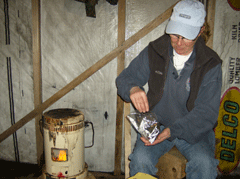
Sheila Merrel grabs a handful of blood worms.(Photo: Ian Gray)
GRAY: Merrel and her friends are avid outdoors people. But that’s not all they have in common. They are also all employed by Bath Iron Works, one of the biggest shipyards in the country. And they’re also members of the International Association of Machinists. As it turns out, many of their fellow union members at the Iron Works also love to hunt and fish.
MERREL: You cannot walk down the production line without seeing pictures of either the fellas or the girls at the yard of what they got this hunting season or last hunting season. Some have a whole wall of all their catches whether it’s fish or deer or bear.
GRAY: But Merrel says that places to hunt and fish in Maine are becoming more and more scarce. A boom in lakefront property is cutting off areas that used to be accessible for fishing. The same is true for hunting lands.
.gif)
Bath Iron Works (Photo: Ian Gray)
GRAY: Plum Creek Timber Company is one of the largest landowners in Maine. The company always made its land available for people to hunt and fish, but as the price of real estate goes up, Plum Creek has sold large tracts of forest to condominium developers. This trend in changing land use isn’t unique to Maine.
MCCARDEN: Our members are definitely finding it harder and harder to find quality areas, whether it’s private or public, to hunt and fish on the weekend when they’re off work.
GRAY: That’s Joe McCarden. He’s a lobbyist for the Plumbers and Pipefitters Union.
McCARDEN: You know a generation or two ago, you could load up your car put some dogs in the back and, you know, a couple buddies could get together and you could ask a farmers permission to go hunting. And that’s becoming a lot more difficult especially as some people are buying these huge estates.
GRAY: For many people, hunting and fishing are not just hobbies, they’re an identity issue, an essential part of life. The desire to defend that way of life is what’s prompted the new Union Sportsman’s Alliance, or USA.
Richard Trumka is Secretary-Treasurer of the AFL-CIO and a fervent fly-fisherman and deer hunter.
TRUMKA: 20 of our unions came together that comprise about 3.2 million of our members, ah, and we said, what do you think about the labor movement getting involved with a conservation group, do you think there’s a need for it? About 70 or 71% of our members said, not only would we like to get involved, but we’d like to join a group that’s sponsored by our union who can help us create habitat for the sports that we like.
GRAY: Then came a happy accident. Fred Myers with the Teddy Roosevelt Conservation Partnership was at a conference of conservation groups in Washington D.C. when he ran into a union leader from the Plumbers and Pipefitters.
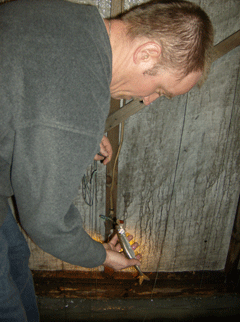
Dan Loudermilk with a smelt. (Photo: Ian Gray)
GRAY: Myers decided that since the Teddy Roosevelt Partnership is an umbrella organization for other conservation groups, it was in a good position to help the unions.
MYERS: Their conversations with me were like, what do we tell our guys to do, do we tell them to join the Turkey Federation, join Ducks Unlimited or Pheasants Forever. But most all of them are all what we call species or critter oriented and there really wasn’t one organization out there until the Teddy Roosevelt Conservation Partnership came along that represented the spectrum of all the hunting and fishing groups that are out there.
GRAY: The TRCP operates by building coalitions around individual conservation issues. That appeals to the unions because it allows them to opt in on certain issues and opt out on others that conflict with union interests, such as logging or limits on all-terrain vehicles.
Joe McCarden from the Pipefitters says the collaboration is already starting to influence his union’s legislative agenda. For example, the Pipefitters are supporting a measure in the new Farm Bill that would pay private landowners to keep their property open to the public.
McCARDEN: It works out for everyone involved. The landowner gets some extra money for allowing people to hunt and fish and access is still preserved for working class men and women.
GRAY: Many hunters are also concerned about loss of habitat for game animals. There’s an oil and gas boom going on in the Rockies. Much of the drilling is on public lands where people hunt and fish and energy exploration can often be disruptive for certain species.
McCARDEN: For our members, you know, they’re really at the center of this issue, we get a lot of jobs from natural gas and petroleum exploration but we’re working with the TRCP to really make sure that energy exploration isn’t done in a way that’s going to drive away all the mule deer and the sage grouse in these areas.
GRAY: Sitting elbow-to-elbow with a conservation group at committee hearings on Capitol Hill isn’t exactly a natural environment for a union lobbyist, but McCarden says the Pipefitters’ are adapting
McCARDEN: In the building trades we’ve kind have been labeled as the enemies by the environmentalists, they look at us as the sell-out Democrats who push for energy exploration. And that’s not the TRCP’s position, so there wasn’t that hostility there, but there was a little kind of awkwardness at first.
GRAY: No one knows how many union members will opt to join the USA, but the potential is large. If all the workers of the 20 AFL-CIO unions joined, about 3.2 million people, the USA would rival the National Rifle Association in membership, a fact that’s been noted in NRA literature.
PECK: What’s interesting about this change is that it’s an opportunity to see a new kind of political constituency literally being born.
GRAY: Gunther Peck is a labor and environment historian at Duke University.
PECK: And so I think it would be healthy for the environmental movement to have this new constituency of union conservationists, even if they wrinkle, and they will wrinkle some of the traditional priorities within the mainstream environmental movement.
[SMELT HUT SOUNDS]
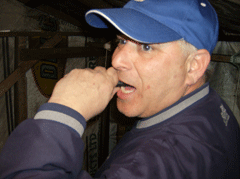
Ronny Wallace bites the head off his smelt.
(Photo: Ian Gray)
GRAY: Back in the smelt hut on Merry Meeting Bay, the night grows long and the schools of smelt head out to sea under the last of the spring ice. Sheila Merrel, Ronny Wallace and Dan Loudermilk chase bites of pork rinds with hard lemonade as they swap fish stories.
MERREL and WALLACE: Were you there when I caught that Pike. Oh Christ yes 33 and a half inches she was the only one that caught one what did I say, I told the guys that I had this big old perch, yeah.
GRAY: All of a sudden one of the lines starts to cut against the current.
MULTIPLE VOICES: Get it, where’s Ronald’s bucket, right there three feet that’s the magic number.
GRAY: The first smelt of the night is hauled out of the water, it’s body flaps in the air.
MERREL and WALLCE: You must bite the head I’ll bite it too, Ronny’s got to he caught it wait a minute rules are rules, it doesn’t really taste that bad oh yeah this is serious this is something you guys really do? She does, I’ve never done it give me the goddamn thing good job, son of a bitch.
GRAY: It might not be everyone’s idea of a weekend in the woods but it would be hard to get any closer to nature. For Living on Earth, I’m Ian Gray.
Related links:
- Union Sportsman's Alliance page
- Teddy Roosevelt Conservation Partnership
- Youtube video of tv show "Escape to the Wild," designed for union sportsmen and women
Shine A Light
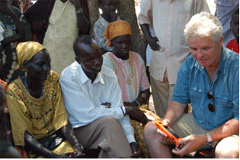
Mark Bent demonstrates the solar powered flashlight in a refugee camp in Fugnido, Ethopia. (Courtesy of Mark Bent)
GELLERMAN: Edith Wharton once wrote: “There are two ways of spreading light….to be the candle or the mirror that reflects it.”
Well, former Marine Mark Bent is trying to spread light both ways. And if his company Sun Night Solar is successful it will illuminate lives in ways never before possible. Sun Night Solar makes the Bogo Light. Instead of using expensive, disposable batteries, Bogo Light flashlights draw their power from the sun. And also fuel Mark Bent’s other goal--to shed light in places now dark due to poverty and war.
Mark Bent joins me from Houston, Texas. Hi Mark.
BENT: Hello Bruce.
GELLERMAN: Well, I’ve got one of your flashlights in my hand. It’s orange but it’s not like any flashlight I’ve ever seen. Why don’t you describe it for me?
BENT: Sure it’s a rechargeable battery flashlight, it’s a task light. It’s got a solar panel on the side. It’s got light emitting diodes in it, six of them, super bright. And it’s got three rechargeable double A NiCad batteries. And what it’s designed for is to provide light to the developing world.

The Bogo-buy one give one-solar powered flashlight.(Courtesy of bogolight.com)
BENT: Because the concept is buy one give one. An American buys a light and they give one away. An American can buy my flashlight for 25 dollars and for that price, no more money, I deliver a second light to Africa. I put it in Africa. And I give a non-profit like United Nations High Commission for Refugees or Samaritan’s Purse or Save the Children, or Feed the Children, all my partners, I give them a light and they pass it out as part of their community service and work.
But also being a former Marine, I have a deep affection and love for my brothers in uniform and so you also have the ability, if you like, to donate them to the troops either in Afghanistan or in Iraq.
GELLERMAN: How did you get this bright idea?
BENT: Well I lived in Africa for about 20 years, first as a Marine then as a diplomat with US foreign service and the last five years as an oil executive. I was running a subsidiary of an oil company in Eritrea and my employees, who I cared for deeply, knew I was leaving and I wanted to do something for them that was more than just a temporary fix so I went to some of their villages and they were still using kerosene lanterns. And so when it hit me really hard that lighting was such an integral part of their lives and they couldn’t afford it I really wanted to do something so I felt compelled to move in this direction.
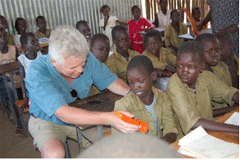
Mark Bent gives a child in Fugnido, Ethopia a solar powered flashlight. (Courtesy of Mark Bent)
BENT: The World Bank estimates 1.6 to 2.2 billion people, so we’re talking one third of the world is off the grid. And if you’re off the grid you have to rely on three things: kerosene, candles, and conventional flashlights. Now kerosene is bad for the environment. It’s bad for people breathing in the fumes. 1.6 million people, mostly women and children die of cancer each year because of the fumes from kerosene. One kerosene lantern puts out 100 kilos of carbon gases a year. And so you talk about the number of people that use kerosene lanterns and so that’s really bad.
And the other issue is even here in the United States most people don’t recycle their batteries. EPA states that less than one percent of our landfill waste is batteries but it’s our number one contaminant for ground water contamination with mercury and cadmium and all the other heavy metals that go into the ground water. But with my flashlights they use three nickel cadmium batteries. Right now the batteries will last 750 to a 1000 nights. And so a child or an adult can use the lights for six to seven hours a night for two years plus before the batteries need to be replaced. So we’ll ship in more batteries and do a replacement program to get the batteries out of Africa.
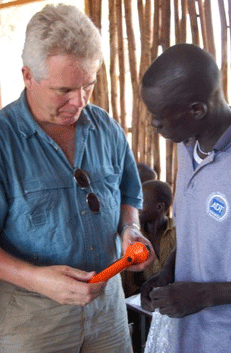
Mark Bent explains features on the solar powered flashlight. (Courtesy of Mark Bent)
BENT: Yeah, what I wanted to do was to get lights to people that really needed them that couldn’t afford them. The World Bank estimates that the average African spends up to one third of their income on kerosene. But look at the economic benefit to an African. If you’re taking away 30 percent of their expenditures you’re giving them a 30 percent raise basically because no longer do they have to pay for the kerosene. You’re allowing them to have a massive economic upgrade in their lives.
Africans aren’t stupid, they just don’t have capital. They don’t have the ability to put things on a credit card, for example, like we do. And so if you give them a 30 percent increase in their disposable income they’ll spend it on an extra chicken or they’ll spend it on extra land to grow tomatoes or maize. And they will be able to leap out of that bottom level of poverty because it gives them that little bit of a head start. All this does is give them that head start which I think is fantastic.
GELLERMAN: What is the saying, “It’s better to light a single candle than to curse the darkness?”

Mark Bent demonstrates the solar powered flashlight in a refugee camp in Fugnido, Ethopia. (Courtesy of Mark Bent)
What I wanted to do was to give them, the Africans, something that empowers them. And it’s an amazing thing. It helps out with education, it helps out with the environment, security in refugee camps. One of the big problems in refugee camps at the UN is violence, sexual violence at night. So we designed this with a finger grip on one side so a woman at night can reach out and touch it and know exactly where the light switch is. It has a glow in the dark ring on it that actually my 15-year-old daughter came up with the idea of doing that. So it really impacts people’s lives in an amazing way.
GELLERMAN: It’s amazing that one light can make such a difference. That’s what’s so stunning about this to me.
BENT: It’s a great feeling when I get discouraged or I get depressed and I think that there’s someplace in the world that’s dark right now and there’s a little kid that’s reading because of my light. We got a note the other day from one of the Sudanese that’s in a refugee camp in Ethiopia and the refugee said that he’d never had such privilege in his life. And it just broke my heart that here we gave him a light, you know, a light that to us is basically a toy but to him it’s the greatest privilege he had. He had no other privilege like that in his life. And that amazes me that something as simple as some plastic and LEDs and a solar panel changes somebody’s life that way.
GELLERMAN: Well, Mark, thank you very much.
BENT: Thank you, Bruce.
GELLERMAN: Mark Bent is founder of Sun Night Solar, makers of the Bogo light.
[MUSIC: The Album Leaf “The Light” from ‘Into The Blue Again’ (Sub Pop Records – 2006)]
Related links:
- BoGo Light
- The United Nations High Commission on Refugees
GELLERMAN: Next week on Living on Earth: you can’t see it but makes up most of the stuff in outer space.
TYSON: It means if you had a blob of dark matter in your lap you'd see right through it, it would fall right through your lap, there'd be no way to contain it because containing something implies that it's interacting with the container.
GELLERMAN: The mysterious nature of dark matter. Next time on Living on Earth.
[“Charles River Accordion Player (Darryl Smith)” recorded by Ashley Ahearn (Sunday, May 27th, 2007)]
GELLERMAN: We leave you this week down by the banks of the River Charles.
[“Charles River Accordion Player (Darryl Smith)” recorded by Ashley Ahearn (Sunday, May 27th, 2007)]
GELLERMAN: Boston’s Charles River is where Living on Earth producer Ashley Ahearn found Darryl Smith playing his accordion.
GELLERMAN: Living on Earth is produced by the World Media Foundation. Our crew includes Ashley Ahearn, Eileen Bolinsky, Ian Gray, Ingrid Lobet, Jennifer Percy, Emily Taylor, Peter Thomson and Jeff Young - with help from Bobby Bascomb, Kelley Cronin, and Lauren Cox. We bid farewell this week to our interns Paige Doughty and Meghan Vigeant. Good luck, have a great summer and thanks for a job well done!
Dennis Foley is our technical director. Our executive producer is Steve Curwood. Alison Lirish Dean composed our themes. You can find us at LOE dot org. I’m Bruce Gellerman.
Thanks for listening.
ANNOUNCER: Funding for Living on Earth comes from the National Science Foundation supporting coverage of emerging science. And Stonyfield farm, organic yogurt, smoothies, and milk ten percent of profits are donated to efforts that help protect and restore the earth. Details at Stonyfield dot com. Support also comes from you, our listeners, the Oak Foundation, the Ford Foundation, and The Saunder’s Hotel Group of Boston’s Lenox and Copley Square Hotels, serving you and the environment while helping preserve the past and protect the future 800-2-2-5-7-6-7-6.
ANNOUNCER2: PRI, Public Radio International.
Living on Earth wants to hear from you!
Living on Earth
62 Calef Highway, Suite 212
Lee, NH 03861
Telephone: 617-287-4121
E-mail: comments@loe.org
Newsletter [Click here]
Donate to Living on Earth!
Living on Earth is an independent media program and relies entirely on contributions from listeners and institutions supporting public service. Please donate now to preserve an independent environmental voice.
NewsletterLiving on Earth offers a weekly delivery of the show's rundown to your mailbox. Sign up for our newsletter today!
 Sailors For The Sea: Be the change you want to sea.
Sailors For The Sea: Be the change you want to sea.
 The Grantham Foundation for the Protection of the Environment: Committed to protecting and improving the health of the global environment.
The Grantham Foundation for the Protection of the Environment: Committed to protecting and improving the health of the global environment.
 Contribute to Living on Earth and receive, as our gift to you, an archival print of one of Mark Seth Lender's extraordinary wildlife photographs. Follow the link to see Mark's current collection of photographs.
Contribute to Living on Earth and receive, as our gift to you, an archival print of one of Mark Seth Lender's extraordinary wildlife photographs. Follow the link to see Mark's current collection of photographs.
 Buy a signed copy of Mark Seth Lender's book Smeagull the Seagull & support Living on Earth
Buy a signed copy of Mark Seth Lender's book Smeagull the Seagull & support Living on Earth

